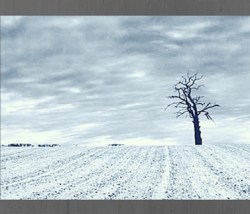White Hunger by Aki Ollikainen
 The severe famine that brought havoc and destruction to nineteenth century rural Ireland has been well documented. Less well known is that more than 250,000 people (about 15% of the population) died when Finland experienced a similarly devastating famine in the late 1860s.
The severe famine that brought havoc and destruction to nineteenth century rural Ireland has been well documented. Less well known is that more than 250,000 people (about 15% of the population) died when Finland experienced a similarly devastating famine in the late 1860s.
This is the background to Aki Ollikainen’s short, disquieting novel White Hunger. It’s 1867: a year which saw the culmination of a series of poor harvests and a particularly harsh winter. Marja, a peasant farmer’s wife from the north, abandons her dying husband and sets off on foot through waist-high snow with her two young children Mataleena and Juho. This is a journey born out of desperation. Their goal is to reach St Petersburg where rumour has it, bread can be found. Not the stuff made pine bark, lichen and straw that they’ve been living on for months, but bread made with real flour.
The chances are slim that all the members of this little trio will survive. They are entirely dependent on the mercy of isolated households they find along the way. Marja struggles through a featureless landscape, from one nameless village to another, from farmstead to almshouse to barn. She experiences the kindness of strangers who share their meagre rations and also the brutality of those who have become embittered by the ceaseless trail of beggars that knock on their doors. Denounced at times as a thief and a whore, what drives Marja onwards day after day is not desperation alone but also hope.
… one day, maybe, there will be talk of things other than bread, the lack of it, or hunger and diseases. People would talk about the coming of spring, the melting of the ice. About the swans someone spotted on the Holy Lake. About the neighbouring fields being flooded.
 The details of her journey are broken with scenes from a town where a doctor and a politician live in relative luxury. The doctor tries to shelter from the shock of the human tragedy, only occasionally feeling a sense of guilt; the politician puts his faith in a new railway to solve the problem. Not until the end of the novel does it become clear how these stories intersect.
The details of her journey are broken with scenes from a town where a doctor and a politician live in relative luxury. The doctor tries to shelter from the shock of the human tragedy, only occasionally feeling a sense of guilt; the politician puts his faith in a new railway to solve the problem. Not until the end of the novel does it become clear how these stories intersect.
Aki Ollikainen’s skill in this novella lies in the way he portrays a snow-bound landscape and ravaging hunger without becoming monotonous. Descriptions of the snow abound naturally along with vivid descriptions of the feeling of hunger. In spare and taut prose Ollikainen animates these forces of nature. Hunger becomes “an angry cat scratching, scraping, sinking its teeth into the pit of her stomach” while frost “spreads weedlike through the window frames along the timber joints across the wall.” and snow pushes in through doors “like a cadaver.”
It takes strong nerves to read this book about people brought to the edge of existence. But steel yourself to do so and you won’t be disappointed. Bleak and harsh it certainly is but utterly memorable.
End Notes
Translated from the Finnish by Emily Jeremiah and Fleur Jeremiah, White Hunger by Aki Ollikainen is published by Peirene Press (Peirene title number 16). Aki Ollikainen lives in northern Finland where he works as a reporter on a local newspaper. White Hunger is his debut work, published to great acclaim in his native country where he won multiple awards. He has written a second novel Musta satu but I haven’t been able to find out anything about this so far.


Pingback: 10 Books That Deserve More Attention : BookerTalk
Pingback: 2016 Man Booker International Longlist | ANZ LitLovers LitBlog
Pingback: January indulgences | BookerTalk
Pingback: Blogbummel Oktober 2015 | buchpost
I have never heard of the famine in Finland. This sounds like a story to save for a bright sunny day in summer rather than the bleakness of a cold winter. I will keep it in mind for future!
This is why there should be more fiction in translation promoted. What better way to learn about the lives of other people.
The stories that are still out there to be told, and to learn about, are endless – that’s what I love about books. I put a request in for this one at my library just last week. I’m hoping it will come in time for Novellas in November. Looking forward to it!
Great review!
Another challenge that sounds good but is going to have to do without me I’m afraid. just not enough hours in the day
Excellent review. Such an extraordinarily powerful book and beautifully expressed despite it’s harrowing nature.
It was certainly powerful particularly given the relatively short length
Great review. I thought this was an excellent novella, very powerful and thought-provoking. Despite the bleakness, I think it’s one of the best novellas in the Peirene list.
It was my first Peirene but I’ve now ordered the new one they are working on which is based on stories of people in the refugee camp in France
This did capture what it must been like to be so broke and hungry and reminds me I haven’t reviewed it yet
it took me quite some time to get around to that too Stu
You’re right, I had no idea about this famine in Finland. Interesting how some bits of history get transmitted so much more than others.